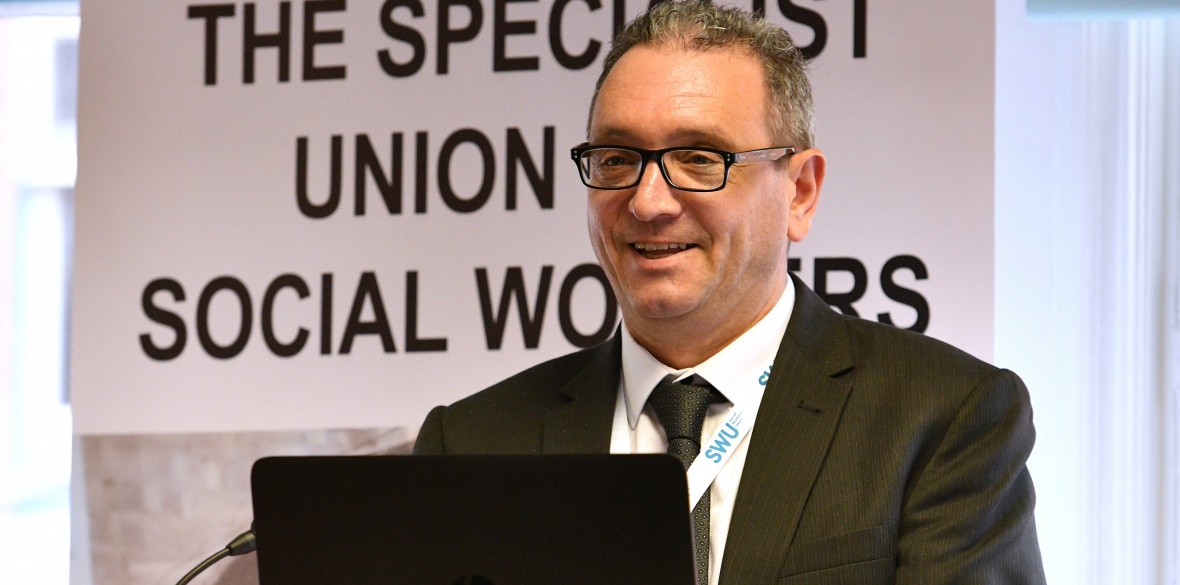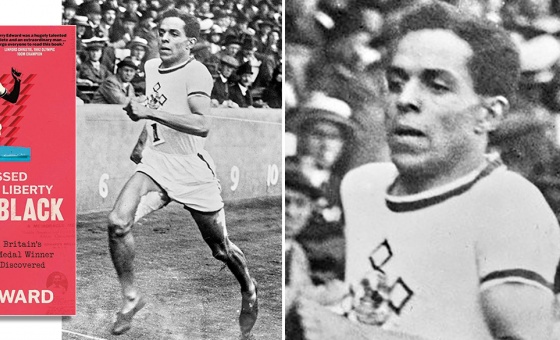This is the last article you can read this month
You can read more article this month
You can read more articles this month
Sorry your limit is up for this month
Reset on:
Please help support the Morning Star by subscribing here
“THERE’S a real thirst for trade unionism within the social work community now,” John McGowan tells me.
This is perhaps unsurprising given the huge cuts faced by local authorities under government austerity measures that have seen services slashed and driven more and more people into poverty.
McGowan knows this only too well. He is a product of Edinburgh’s tough council estates, counting Trainspotting author Irvine Welsh as a neighbour.
While the latter made his name, not to mention his fortune, documenting working-class life in the Scottish capital, McGowan chose a different path and entered the world of social work.
“I was a working-class boy so I went to school and did an apprenticeship,” he explains. “The thought of university was way beyond anybody in our community, so I had to re-educate myself and got into social work later.”
Well respected in his field and author of a number of books, including How to Survive in Social Work which he co-wrote with Neil Thompson, the convivial Scot became the Social Workers Union’s first elected general secretary in 2016, five years after its foundation.
It remains an organisational member of the British Association of Social Workers — the professional association for those working in the field — but is an independent trade union, having applied for TUC affiliation last year but had that declined.
Under his stewardship the union has expanded and was at one stage he tells me “the fastest-growing trade union in Europe.”
McGowan lectures one day a week at the Open University, teaching the practical element of social work and remains a licensed practitioner and has been with the Social Workers Union since its foundation.
With close to 16,000 members, the union represents 10 per cent of the country’s total workforce, something McGowan insists is not to be taken lightly.
The decision to establish the Social Workers Union was important, he tells me, because some social workers felt a specialist union would represent their knowledge base more effectively.
“We felt that our voice was never really heard, particularly in Parliament and in local authorities,” he says, adding that a dedicated social workers’ union gave them a collective strength that had previously been missing.
The union has three or four main strands to its campaign work, McGowan explains, including micro campaigns on specific issues, for example car parking for social workers and the bigger “macro campaigns.”
One of those is the Anti-Austerity Action Group which is funded and supported by both the Social Workers Union and the British Association of Social Workers (BASW).
It was launched in 2017 when 140 social workers and service users took part in a 100-mile march from the BASW head office in Birmingham to the AGM venue in Liverpool.
The union, as well as the campaign, is clear that “austerity is a political choice, not a necessity” and has pledged to “always challenge the types of policies that contribute to poverty.”
This is important to McGowan, who explains that his members often come into contact with service users suffering from food poverty because of government cuts and other policies, including changes to the benefits system.
These experiences led to McGowan and the Social Workers Union advising veteran film-maker Ken Loach on the script for Sorry We Missed You, which tells the story of a family whose children come into contact with social services as they spiral into poverty and their struggle to put food on the table.
The system has seen some major changes under the Tory government, he explains, which has made it harder for social workers to help those most in need of their support.
McGowan explains that social workers no longer have the time to engage with service users in the same way, with the issuing of food vouchers and referrals to foodbanks becoming more like an admin role.
“Now, when people are in destitute poverty, they turn up at a social work department … which means that really we’re only seeing families and adults when it hits a crisis point.
“We should be intervening in the very early days when these people are [first] presenting themselves in our departments,” he says.
Along with the broader, perhaps more political issues, the Social Workers Union deals with the day-to-day issues faced by its members and McGowan says it is uniquely placed to do so as its officials are completely independent from local authorities.
We discuss the changing world of trade unionism and the emergence of the so-called smaller, more specialist unions such as the Independent Workers Union of Great Britain which has achieved huge victories with Uber drivers and food couriers.
“I think there’s a growing trend for the old days of unionism,” McGowan says, talking of a shift away from the bigger unions that developed through mergers or simply being absorbed due to a decline in industry.
Some unions cover 120 professions, he explains, arguing that while they do a good job, “you can’t really advocate for each of these professions within that membership.”
“I think what we lost there was there was the specialisms in each division,” he continues, adding that there is “a real thirst” for this to change with the emergence of the Artists Union England and others, including a union specifically for foster carers.
“Trade unionism used to be a dirty word in the 1990s,” McGowan says, reflecting on years of crushing defeat at the hands of Thatcher.
“The younger population didn’t really have an understanding, but now they are joining trade unions and get the concept of organising collectively.”
The General Federation of Trade Unions — of which the SWU is an affiliate — plays a crucial role in drawing all these campaigns and unions together, he says, highlighting the union’s support for the campaign for £15 an hour in McDonald’s and the unionisation of Wetherspoon workers, both spearheaded by the Bakers’ Union.
“That’s a real strength. I mean, who would have thought that that when you look at Gregg’s, I can’t remember the stats, but I think it’s over 90 per cent of their workforce is unionised … and that’s a real shift,” McGowan says.
Today marks World Social Work Day, first celebrated in 2007 to highlight the achievements of social work, to raise the visibility of social services for the future of societies, and to defend social justice and human rights.
It also aims to change the perception of social workers who are either painted as hippy do-gooders in sandals or people who let children die or snatch them from their families.
“The media is only interested in dreadful stories. That’s the ones that sells papers,” McGowan says. “But I could talk for hours about the difference I have made to people’s lives.”
All people hear are the negatives, he says, “but you don’t hear about the great work we [social workers] do behind the scenes.
“There’s always somebody out there, there’s a social worker out there 24 hours a day, seven days a week. You’re looking after babies, children, young people, adults, families, communities.
“Often people don’t realise that there’s a social worker out there 24/7 365 days a year, looking out for the vulnerable in society and trying to make a difference in people’s lives.
“Social workers love their jobs,” he says, yet many are forced to leave the profession due to cuts and a feeling that they are no longer able to make a difference to people’s lives.
“You want to do something to to change lifestyles, and for me, it’s about being able to assist families and young people with differences in their lives. That drive and love for the profession is what really keeps you going,” McGowan says.
As a trade union general secretary, he understandably has a busy diary for the day, speaking at conferences while the SWU is launching an essay writing competition and engaging with its sister unions across the globe to share stories about what they do well along with the difficulties faced by the profession.
But he underlines the importance of social workers joining a union.
“There’s about 108,000 social workers in the United Kingdom. We’ve got 16,000 in the SWU. But there’s a number of social workers in Britain who are not even members of a union.
“So I would say to them don’t just wait for the car crash and join a union to protect yourself in the future.”










